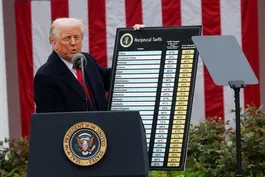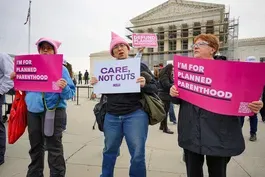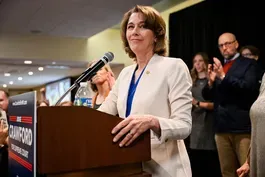
Cuts will grind HHS work to a halt, former secretary says
Clip: 4/2/2025 | 8m 35sVideo has Closed Captions
Important HHS services 'will grind to a halt' with cuts, former Secretary Sebelius says
There’s growing concern over massive cuts to the Department of Health and Human Services as Secretary Robert F. Kennedy Jr. works to reduce the agency workforce by 25 percent. Geoff Bennett discussed the Trump administration's cuts with Kathleen Sebelius, the HHS secretary during the Obama administration.
Problems with Closed Captions? Closed Captioning Feedback
Problems with Closed Captions? Closed Captioning Feedback
Major corporate funding for the PBS News Hour is provided by BDO, BNSF, Consumer Cellular, American Cruise Lines, and Raymond James. Funding for the PBS NewsHour Weekend is provided by...

Cuts will grind HHS work to a halt, former secretary says
Clip: 4/2/2025 | 8m 35sVideo has Closed Captions
There’s growing concern over massive cuts to the Department of Health and Human Services as Secretary Robert F. Kennedy Jr. works to reduce the agency workforce by 25 percent. Geoff Bennett discussed the Trump administration's cuts with Kathleen Sebelius, the HHS secretary during the Obama administration.
Problems with Closed Captions? Closed Captioning Feedback
How to Watch PBS News Hour
PBS News Hour is available to stream on pbs.org and the free PBS App, available on iPhone, Apple TV, Android TV, Android smartphones, Amazon Fire TV, Amazon Fire Tablet, Roku, Samsung Smart TV, and Vizio.
Providing Support for PBS.org
Learn Moreabout PBS online sponsorshipAMNA NAWAZ: There's growing concern over massive cuts to the Department of Health and Human Services, as Secretary Robert F. Kennedy Jr. works to reduce the agency work force by 25 percent.
The "News Hour" has invited Secretary Kennedy multiple times to join us on the show.
His office has not yet responded.
But among the cuts are 3,500 jobs at the FDA, which regulates food and medicine safety, 2,400 at the CDC, the national public health agency, and 300 jobs at the Centers for Medicare and Medicaid Services, which oversees those programs and the health insurance marketplaces.
For one view on all of this, we turn now to Kathleen Sebelius, the HHS secretary during the Obama administration.
Secretary Sebelius, welcome to the "News Hour."
Thanks for joining us.
KATHLEEN SEBELIUS, Former U.S. Health and Human Services Secretary: Well, thanks for having me, Amna.
AMNA NAWAZ: So, as you have probably heard, Secretary Kennedy says that he can lose 20,000 workers, that's about 10,000 through cuts, another 10,000 through retirements and buyouts, without affecting the services that the agency provides.
This is an agency you have run.
Do you think that can be done?
KATHLEEN SEBELIUS: Well, unfortunately, Amna, to me, it's another indication of how little Senator -- Secretary Kennedy understands about this massive agency.
HHS is intertwined with state governments, with local governments, with tribal governments.
And it's not just about losing some nameless, faceless bureaucrat in Washington, D.C. What the massive layoff will mean is that you lose expertise, you lose timeliness, you lose an opportunity to get not only the best products to market in a very fast manner, but a food outbreak that could occur anywhere in the country.
That's part of the FDA's job, is that they work with industry to quickly get those foods off the market, so my kid doesn't get harmed by the peanut butter.
Here in the heartland, in Kansas, we're going to lose health employees from the CDC who have been working closely with our local health offices to monitor outbreaks, to keep vaccines up to date, to make sure that data is shared from state to state.
Those employees are all over the country.
They will suddenly be gone.
We're going to go into hurricane and tornado season very shortly.
The first people on the ground when a disaster hits are from the CDC.
They make sure the water is safe, so people can go back and relocate.
We're talking about real impact at every point in the country.
And, unfortunately, after six weeks, my guess is Kennedy has not only not visited the 13 divisions, but he really doesn't know or doesn't care what the people do.
AMNA NAWAZ: We should note that these cuts will now downsize the agency to some 62,000 positions that would remain.
Secretary Kennedy has also made an economic argument for these cuts.
He has said that HHS is the biggest agency in the government.
He said it's twice the size of the Pentagon with $1.9 trillion, suggesting that these job cuts could help to tame the budget.
Could they?
Do you see that point?
KATHLEEN SEBELIUS: Most of the money that is in the HHS budget goes out the door.
It's the largest transfer of federal funds to states through Medicaid, childcare grants, mental health block grants, Agency on Aging, help and support, home health services.
So, this is not money that's hiring people inside of D.C. offices.
It's money that really is essential to health services in every state in the country and in tribal governments throughout our land.
So, cutting the budget really is not about people, as much as it's about really harming the services that go out to American folks.
If the personnel isn't there to make sure that Medicare payments go out on time, to make sure that people can enroll and get the health insurance that they're entitled, to make sure that the block grants go out on childcare and mental health services, those services grind to a halt.
And it hurts everyday Americans who desperately need the health services that HHS helps to deliver.
AMNA NAWAZ: We have also heard a top adviser to Secretary Kennedy make an argument that he says the agency has basically been failing in its mission to the American public.
He points to rising rates of chronic disease, to lower life expectancy in recent years, and also a culture that he claims is too quick to medicate patients without addressing underlying causes for the disease.
What's your response to that argument?
KATHLEEN SEBELIUS: Well, I don't think there's any question America spends more and in some ways has a lower return on investment than most of our competitive Western European nations.
We have a very expensive health care system, again, not because of HHS.
Private insurers have a lot more overhead and a lot less return on the dollar.
There's been a real pivot since the passage of the Affordable Care Act in 2010 to preventive services, to look at the underlying causes of obesity and heart disease, to invest in healthier foods, more exercise programs, programs that actually do diabetes prevention, instead of waiting and treating the disease.
I think those efforts are really important.
I'd love to see us double down on prevention services and pay more to keep people healthy than treat them when they're sick.
That's great.
But you can't tell the measles that is now breaking out throughout the country -- we have our first measles cases in 15 years in Kansas, and it's an alarming rate of spread.
You can't tell an infectious disease just to stop because we're going to focus on diabetes.
We have to be able to walk and chew gum at the same time.
We have to be able to do multiple things.
Infectious diseases will come.
Disasters will come.
And chronic disease is here to stay.
So all those efforts are critically important.
He is clearing out of agencies, from what I can read and ascertain, the top tier of expertise, not people who came in as politicals with one or another administration, but people who had been working in these fields for a long time.
AMNA NAWAZ: As you know, this is all part of the Trump administration's plan and agenda to try to cut what they call bloat in the federal government work force.
You have led this agency, so I have to ask, if there were changes you would suggest that need to be made at HHS, what would those be?
What should change?
KATHLEEN SEBELIUS: Well, I think any good CEO, private or public company or government, looks constantly at ways to be more efficient.
Can -- are there redundant jobs?
Can you put people together?
I was amused by some of the suggestions that agencies work more closely together that are in very different locations.
Some are in Washington, D.C.
Some are in Atlanta.
And while that's an interesting theory, it's very difficult to conduct that mission.
But constantly reviewing what can we do better and really keeping the consumer front and center, the patient front and center, what services can we deliver more timely and more effective to the American public, not where my grudges, where I want to dispute old and long-term scientifically proven vaccines, safety and effectiveness.
I mean, I think this agency is quickly, unfortunately, going off the rails with leadership who has a very clear agenda, doesn't know really what happens throughout the breadth of this organization, and is likely to do a lot of unintended harm by slashing expertise, slowing down approvals of vaccines and cosmetics and food and drugs, not being able to respond in a timely fashion to food outbreaks or natural disasters.
We're going to be in a very vulnerable situation.
AMNA NAWAZ: That is the former Secretary of Health and Human Services Kathleen Sebelius us tonight.
Secretary Sebelius, thank you for your time.
Really appreciate it.
KATHLEEN SEBELIUS: Thank you.
How private equity in health care is affecting patients
Video has Closed Captions
How private equity's increasing role in health care is affecting patients (8m 20s)
How Trump's tariffs could shake up U.S. and global economies
Video has Closed Captions
How Trump's sweeping new tariffs could shake up U.S. and global economies (6m 46s)
News Wrap: Myanmar earthquake death toll tops 3,000
Video has Closed Captions
News Wrap: Myanmar earthquake death toll tops 3,000 as civil war hampers relief efforts (6m 45s)
Supreme Court hears Planned Parenthood Medicaid funding case
Video has Closed Captions
Supreme Court case could decide if states can block Medicaid funding to Planned Parenthood (5m 39s)
West Philadelphia uses art to confront neighborhood problems
Video has Closed Captions
West Philadelphia uses art to confront neighborhood problems and threats to democracy (7m 4s)
What Florida and Wisconsin elections tell us about voters
Video has Closed Captions
What election results in Wisconsin and Florida tell us about voter sentiment (8m 33s)
Providing Support for PBS.org
Learn Moreabout PBS online sponsorshipMajor corporate funding for the PBS News Hour is provided by BDO, BNSF, Consumer Cellular, American Cruise Lines, and Raymond James. Funding for the PBS NewsHour Weekend is provided by...

















